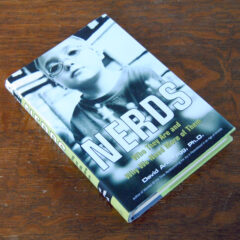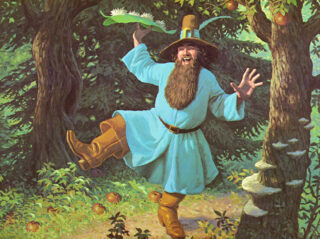
“Hostility towards nerds and geeks wastes a lot of human capital and impoverishes everyone in the process.” Speaking as someone who has taken his share of this hostility, it’s never easy to bear the brunt of it, but at least thanks in part to David Anderegg, Ph.D. and his book Nerds, I understand where it came from.
Even if it comes from a dark place and is always unwarranted.
If you identify as a geek, congratulations, this is a book for you. If you are raising a child, congratulations this book is for you. If you are marginalized, congratulations this book is for you. If you are worried about the future of America, congratulations this book is for you.
Why? Well, for one Anderegg’s pith chapter titles are not only great complete with fantastic subtitles, they tell an unfortunate tale;
- The Field Guide to Nerds (or Why Nerds are so gay)
- Math Scores and Economic Ills (Or why you need to go to india to find an engineer)
- Old themes and new twists (or why ichabod crane will never get laid.)
- They can’t help it, they’re just sick (or how better treatment might help cure bill gates)
- The Seinfeld Axion (or why nerds know advanced calculus but can’t get to first base)
- The Geek Squad (or why you’re not grateful to the guy who fixes your computer)
- They’re not ugly, they just need a makeover (or why they think no one can see the tape on their glasses)
- I’m not boring you, Am I? (Or what is this thing called The Silmarillion?)
- Welcome to my persecution (or why the george bush-al gore contest was a jungian’s dream)
 The sad truth of this book is that even in conjecture and unproven theories that Anderegg expounds upon to raise points of interest or future research projects for others, they are, in my experience, truthful and painful.
The sad truth of this book is that even in conjecture and unproven theories that Anderegg expounds upon to raise points of interest or future research projects for others, they are, in my experience, truthful and painful.
That doesn’t mean there’s no hope, that’s why this book is basically for everyone, but still, I’m not that optimistic of a person in general. So the rise of anti-intellectualism before he published this book in 2007 and since is scary, especially given its historical precedence which this book states well.
But this book also opened my eyes to something that I’ve longed to understand about myself. During episode nine of The Palmer Files I argued about the lack of Tom Bombadil in Peter Jackson’s Lord of the Rings trilogy, something I have done for years and a piece of art I resisted celebrating for a very long time.
It was author David Anderegg who told me why I couldn’t let it go. It’s because of what Tolkien meant to me. It was because by reading The Lord of The Rings “you were by definition a nerd or geek. But now that it has been made into a lush, easy-to-watch, thrilling movie, it is no longer a nerd shibboleth.”

Tom Bombadil
I believe my hesitance to accept Jackson’s brilliant work with Tolkien’s masterpiece was because I lamented the loss of this shibboleth.
However, the book is more than just helping this nerd come to terms with past issues. It’s an understanding of the issues we will face in the coming decades as an American culture that needs science but ridicules would-be scientists at a time when it matters the most.
Personally, I was ridiculed as a geek or nerd when I could have chosen a science or math track in middle school or early high school, for me, it was two really great English/Literature teachers that steered me into the humanities, but as this book states, sometimes it is the will of not wanting to be labeled a geek or a nerd that makes that decision for potential scientists.
And whether you or I like it or not, science and math will be necessary in the decades ahead. And this book, while not a complete roadmap for getting back on track and fighting anti-intellectualism stereotypes early, is a great start on the road to recovery and a better tomorrow.
Read the Secret File of technical information and quotes from Nerds.